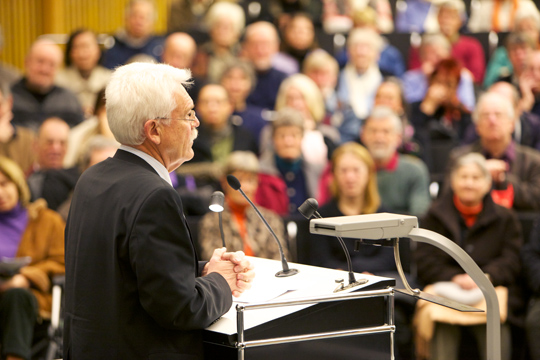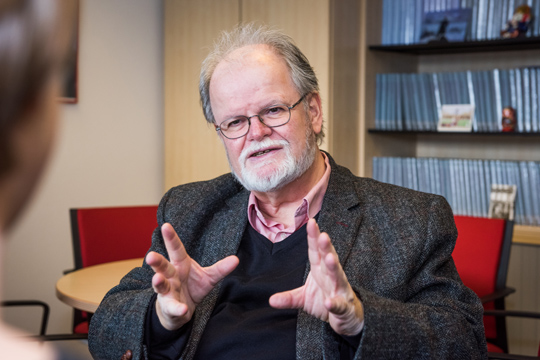Listen, debate, collect points
Freiburg, Mar 19, 2018
For more than 70 years the University of Freiburg has had the Studium Generale as a vehicle to transport university knowledge to the public at large. It was originally conceived as a preparatory course to make it easier for young people to get into their studies during the confusion following the Second World War; since then it has morphed into a broad palette of courses and lecture series. In October 2017, literature professor Werner Frick became head of the Studium Generale. He spoke with Sonja Seidel about this summer semester’s new options - and about just how important the Studium Generale is at the University of Freiburg.

Full house: Saturday Uni fills the lecture hall every week. Photo: Baschi Bender
Professor Frick, why did you decide to take on the directorship of the Studium Generale?
Werner Frick: I have been impressed by the work of the Studium Generale in Freiburg for a long time. It was the first in Germany and is now the one with the greatest number of courses. I have also been actively involved in things like the many Saturday Unis for quite a while. I also thing it is more important than ever for academics to not be barricaded in their ivory towers and to not communicate only in their hermetic academic jargon. They need to explain to the broader public what it is they do - and not just because they work on public money.
Does it have a responsibility to society?
It certainly does. To me it seems very important that academia has a leading voice in public debate and has something to say about issues which are important to us all. Especially in these disorienting times in which there is so much skepticism towards science and academia and we often face populist rhetoric, pseudo-truths, and conspiracy theories. The academic sphere must counter that with its characteristic calm, by using rational models to explain the world in comprehensible language and clear terms. The Studium Generale is a good place for that. And the response to our courses in this open and highly educated Freiburg society shows that there is a need for it - last semester in Saturday Uni alone we had a total of 14 lectures under the topic “500 years of Reformation: Luther and the repercussions,” and every time the big lecture hall 2004 was packed.
What new formats do you have planned for the summer semester?
This summer semester we are launching a new format which I am especially proud of. We call it “Books people talk about,” and it’s a forum for many-faceted debates and the argumentative verbal exchanges over newly-published non-fiction which take place in the presence of the authors. With this, we aim to show that science and academia are not just respectful listening, but also lively exchange and cultivated debate. I know this kind of event from my time at Stanford; the format there was called “author meets critics” and it was a big hit. Here, in the leadup to the soccer world cup we will discuss Jürgen Kaube’s new book essay “Lob des Fussballs” (In praise of football) with a number of professional soccer aficionados, and also with Volker Finke, who has coached SC Freiburg for many years. A further tradition, which we aim to revive this summer semester, is that of discussion on the current productions at the Freiburg city theater. Participants themselves become the dramatists, actors, and directors of selected pieces in the acting and musical theater, just like the experts from the sciences and the humanities and the professional critics. And the public is invited to take part.

Studium generale is a good place to enter into a dialogue with the general public, says Werner Frick. Photo: Klaus Polkowski
What is the future direction for the Studium Generale?
We could get better at involving students. Since the Bologna reforms, they have had to study under considerable pressure and behave very much in goal-oriented, ‘focussed’ ways; and that has its downsides. The notion of puffing and panting your way through your studies, looking neither left nor right, I find rather small-minded. We can work to counter that by offering ECTS credits to students for regular attendance at Studium Generale events which help to broaden their horizons; those credits can then count towards elective or optional modules - which thankfully still exist - in their study programs. I am currently in negotiations with the deans and heads of study programs at various faculties as to how we can manage this in practical detail. I would also love to establish a “Young Freiburg University” - a variation on the Children’s University which other universities also have - which would target the 12 to 16 age group. I think we can break down teenagers’ concerns and awaken their interest in what a university is and what it has the potential to do.
What is the idea of the Studium Generale to you?
The Studium Generale was always meant to be a complementary reinforcement of the narrowly-defined study of a subject. Its goal was always to look beyond the horizons of the individual subject culture and show that there are important topics and complex issues which no one discipline alone represents or has a monopoly on.
Registration for courses
You can register for Studium Generale courses in the coming summer semester starting 23 March 2018.
For more information

